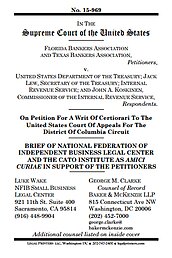Florida Bankers Association v. U.S. Dep’t of Treasury
Learn more about Cato’s Amicus Briefs Program.
New IRS reporting requirements force U.S. banks to disclose interest-earning accounts of non-resident aliens to the government. (Apparently this is tax-authority mutual back-scratching: foreign nations are expected to reciprocally report this type of information about U.S. citizens with accounts abroad.) Under this regulation, refusing to disclose non-resident alien accounts results in a fine. The Florida and Texas Bankers Associations are trying to challenge this regulation, but are being frustrated by interpretative jiggery-pokery that prevents their serious legal arguments from even being heard. While the federal district court allowed this lawsuit to proceed, the U.S. Court of Appeals for the D.C. Circuit reversed course and held that the associations couldn’t challenge the regulation because, under the Anti-Injunction Act (AIA), one can’t challenge a tax until the government has attempted to enforce the allegedly improper law and collect the attendant tax. The D.C. Circuit—seemingly imitating Chief Justice Roberts’s reasoning in NFIB v. Sebelius—held that the penalty triggered by failing to follow the new reporting requirements was a tax, thus subjecting the lawsuit to the AIA. Cato has banded together with the National Federation of Independent Business to file an amicus brief in support of Supreme Court review. The AIA’s statutory language should be interpreted as the Supreme Court has interpreted the Tax Injunction Act (TIA)—confusing, but not the same law—because they contain almost exactly the same language. Under the TIA, one cannot challenge a regulation that deals with either the “assessment” or “collection” of taxes. Similarly, the AIA only prohibits challenges that have the “purpose” to “restrain” “assessment” or “collection” of a tax. Since the fine at issue is a penalty for regulatory non-compliance, not a tax as properly understood, the AIA shouldn’t bar judicial challenges. Moreover, with the way in which the D.C. Circuit read the “penaltax,” it created an issue under the Administrative Procedure Act (APA). The APA contains a “strong presumption” of judicial review prior to enforcement of substantive regulations like the one at issue here. Congress intended that all agencies’ substantive regulations would be subject to such review under the APA—not that the IRS would have no accountability before federal courts. People have a right to be sure of a regulation’s meaning before engaging in costly compliance efforts—and that’s exactly what pre-enforcement judicial review provides. Finally, the APA contains stringent procedural requirements for how regulations are to be promulgated: for example, there must be an adequate explanation of the rule, notice and an opportunity for comment, and publication of proposed rules in the Federal Register. The Treasury Department and IRS frequently ignore these requirements—recall the various Obamacare delays, waivers, rewrites, and suspensions—and these agencies must be reigned in. The Supreme Court should take up this case and reverse the lower court’s dangerous precedent. You shouldn’t need to wait until the government attempts to enforce a penalty against you before being able to challenge it.
